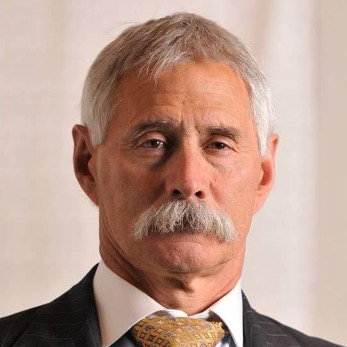How do you define a surgeon-scientist?
A surgical scientist will see a problem based on their observations managing patients, collect information, then establish a research project in the laboratory to elucidate the underlying mechanisms. Then, they take this new information gleaned from laboratory investigation back to the patient bedside to determine if it will improve care. The objective of this patient-oriented research is finding new and better ways to care for patients.
When did you first become interested in research?
I had a unique opportunity when I was going to college in western Pennsylvania, Allegheny College, where the University of Pittsburgh School of Medicine developed a novel program that provided a salary for college students to participate in basic research during the summer. I became inspired by observing research with some of the luminaries in surgery – Dr. Henry Bahnson, a cardiac surgeon who repaired the first torn aorta; Dr. Theodore Drapanas, competing to do the first human liver transplant; and Dr. Larry Carey, a surgeon defining the physiologic responses to shock. At the time I worked in their labs, I frankly didn’t appreciate the impact of these surgeons, but they were true legends in surgery. I watched them go through the research process, and it stimulated me to realize how enjoyable it is to do research. You take problems you see in patients at the bedside, study them at the basic level in the lab, and then return to apply the results to patients.
I think we need to expose more students to clinically related basic research much earlier. I think the program I was in should be emulated, where we take undergraduate students and get them into basic laboratories to cultivate their scientific curiosity as they mature. After I had that college experience, then I went to the University of Pittsburgh as a medical student so I was able to continue working in those research environments throughout medical school. We need to expose college and early medical students to basic research and get them intrigued, help them experience the gratification of doing fundamental research.
Basic research isn’t for everyone, though.
That’s true, not every person enjoys basic science and you can’t force interest on them. I think individuals who have the innate curiosity to figure out what makes things work should be identified and encouraged and supported into participating in basic research. But there are other types of research that are important – for example, outcomes research and education research.
We need to get students to recognize their clinical interests early and provide exposure and development in these areas. When I first started at Denver General (now Denver Health) in 1976, Dr. Ben Eiseman had just described multi-organ failure and I was instantly in this environment where we talked about the driving mechanisms of multiple organ failure every day when few others in the country recognized the syndrome. When Dr. Alden Harken became chairman at the University in the early 1980s, he was instrumental in establishing our long-term NIH -supported trauma research program and cultivated the team approach to discovery.
Over the years we gradually transitioned from multiple organ failure research to studying coagulation – people die from bleeding after trauma and how can we reduce that burden? I’ve not made any revelations that warrant me making plane reservations to Stockholm, but I’m happy to have made small contributions throughout my career and to see standards of patient care change based on our bench research that comes full circle back to the bedside. Success in research depends on the team and I’ve been lucky to collaborate with very capable PhD basic scientists, and fortunate to have surgical residents who are motivated and disciplined to be scientific and pursue basic science. I never would have accomplished any of our research without these essential partners.
The fact that we’re even talking about this indicates it’s maybe not as common to say “researcher” in the same breath as “surgeon.”
Health care has become a business rather than a profession. Fundamentally, there are disincentives to do basic research – surgeons get paid to operate and hospitals get paid for operations, so whether it’s indirect or direct, there are disincentives to having surgeons in basic laboratories when they could be in the operating room. But you can’t ask the right questions unless you confront and identify problems that exist in patients every day. We see things that we think could be done better, no question about it, and if you don’t have surgeons asking these questions that initiate research, who’s going to?
How does this change, then? How do we support surgeons as researchers?
I think it requires a culture change, and there’s going to have to be changes at the federal level. If you look at how many surgeons in academic centers have NIH grants, it’s fewer and fewer every year. Internal medicine and their various specialties do it much better than we do. So, some of it has to happen federally with the NIH recognizing the need for surgical scientists. We need to examine cultural disincentives as well. Surgical residents can pick up their phones and Google to have an answer for clinical management instantly. As articulated in the recent book “The Death of Expertise," there is defensiveness among trainees that we’re trying to expose them for not knowing the science or that we’re trying to intimidate them by suggesting they’re insufficiently pursuing the questions. It’s getting harder to engage trainees and colleagues with following the logic of wait a second, why do you think we do that? What do you think the mechanisms are? That’s been a penalty of social media, at least in part, that you don’t have to think about why you do it today, you only have to look at your phone and find the most recent guideline or algorithm and no one’s going to challenge you.
So, we need to look at where we are as a culture, and we need our institutions supporting essential research. In the CU Department of Surgery, it’s encouraging because Dr. Schulick is firmly committed to research and it’s mandatory that all surgical residents do two years of research. And not all of that research is basic, appropriately, because again, there are critical gaps in education and patient outcomes that we need to study.
Your career has spanned 50 years; what have you gained from being a surgeon-scientist?
A thing that’s common to most surgeons is we love the technical challenges, and I continue to enjoy that aspect. But the exciting thing about research is you often come up with projects you never envisioned initially. Sometimes it’s when you get the opposite results to your hypothesis that lead to the most productive outcomes. As a trauma surgeon, I can take part of an organ out, but then as a researcher I ask what could we have done better. What can we do differently to better care for our next patient? I have been very fortunate to have experienced a career that integrates basic investigation into clinical care, and hope we can offer this opportunity to future generations of surgeons. Ultimately, our patients will benefit the most from advancing the scientific basis for their personalized care.





.png)
